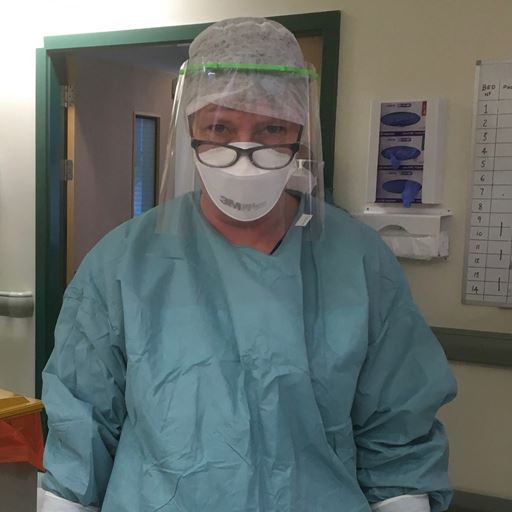The former Dean of our School of Health and Social Care has returned to the frontline as a critical care nurse 18 years after she last worked in a hospital.
Vikki-Jo Scott has joined health professionals across the country who have gone back to help deal with the enormous pressure COVID-19 has placed on our NHS.
A specialist critical care nurse, Vikki-Jo stood down as Dean in December and had hoped for a quiet period when she would start a PhD and be able to brush up on her clinical skills before returning to the classroom to teach on our health and social care courses.
Instead she has found herself in the midst of a national crisis – literally dealing with life and death every day.
She spent two weeks in training, to bring her up to speed with everything that’s changed since she was last in intensive care. This included having to pass a ‘fit test’ to make sure she was able to correctly fit the personal protective equipment required, which she often has to wear for five or six hours at a stretch.
Then it was straight back into 13-hour shifts at the hospital where she trained and worked before moving into academia.
“It has been physically, mentally and emotionally tough and everybody is feeling exhausted but we are all working together to do the best we can in very unusual circumstances. The teamwork is absolutely amazing and I feel so privileged to be part of that and to be able to use the skills and experience that I have to help in some way.”
Difficult decisions have to be made every day, but for Vikki-Jo the hardest thing has been watching patients cope with a really traumatic situation without the support of their loved ones.
“For most people recovery from coronavirus is really high. We are only seeing the minority of patients, but once you get to critical care things are serious and people are terrified they are going to die.
“Normally the family is key to keeping those in critical care connected to normal life – giving them the hope and strength to keep fighting. Instead they are having to go through this alone. It is heart breaking, but we do what we can.”
Vikki-Jo has seen patients recover and leave critical care, but she has also seen others not pull through.
And with no evidence yet that we have reached the peak of the epidemic, she has no idea how long her services will be needed.
“To a certain extent that depends on how well people comply with the restrictions which are impacting on everybody’s lives. They are difficult, but are our only hope of being able to return to some kind of normality soon.”
“There will still be an enormous job to be done when we get past the period of people needing critical care. Then we’ll need to move to the support and rehabilitation of patients and dealing with the mental health impact of all of this.
“Many of my colleagues in the School of Health & Social Care, as well as students and former students are already helping and I am sure more will in the future.”

.jpg?mh=500&mw=500&hash=6568B6C9CCF5290A596BEF6678B6AD0E)




